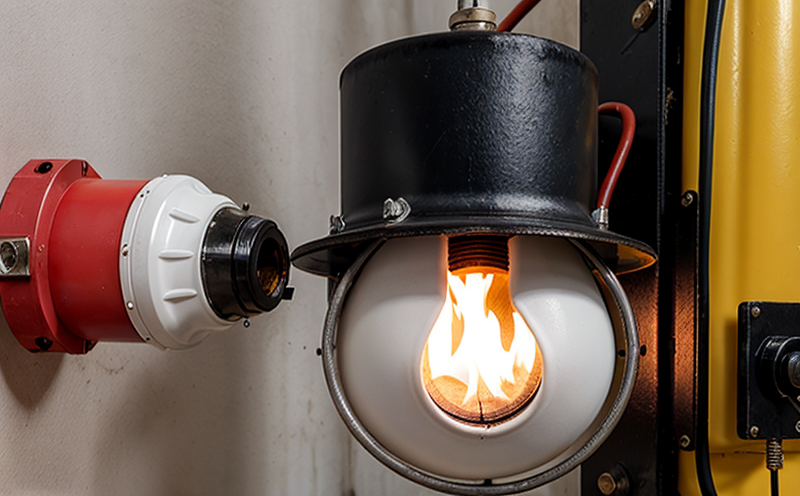Flame detector inspection
In a fire safety and protection system, flame detectors play an essential role in identifying early signs of combustion. These devices are critical components designed to detect flames and provide immediate alerts to prevent the spread of fire. Ensuring that these detectors function correctly is paramount for maintaining safe working environments. Flame detector inspections involve thorough examinations to verify their operational integrity, reliability, and compliance with relevant standards.
The inspection process typically includes a series of tests aimed at evaluating various aspects such as sensitivity, response time, and integration within the broader fire protection system. Quality managers, compliance officers, R&D engineers, and procurement specialists are key stakeholders who benefit from these inspections. They ensure that flame detectors meet international safety standards and perform optimally under real-world conditions.
During a typical inspection, technicians will perform multiple checks including visual inspection of the detector’s exterior for any signs of damage or wear, check the power supply to verify it is functioning correctly, and conduct functional tests by simulating various scenarios that may cause a fire. Calibration and adjustment of settings are also part of this process ensuring accuracy.
One crucial aspect of flame detector inspection involves understanding applied standards which guide testing procedures and acceptance criteria. These standards help maintain uniformity across different environments and ensure reliability regardless of location or application type.
| Applied Standards | Description |
|---|---|
| ISO 9623-1:2017 | Guide for flame detectors in industrial environments |
| UL 864 | Flame detection equipment |
| EN 54-2:2017 | Fire detection and fire alarm systems – Part 2: Flame detectors |
The inspection also considers competitive advantages and market impacts. By adhering strictly to these standards, organizations can demonstrate their commitment to safety and compliance. This not only enhances trust but also protects against potential legal issues related non-compliance.
- Enhances overall system reliability by identifying potential failures early
- Promotes safer working conditions through timely detection of fires
- Aids in meeting regulatory requirements, reducing the risk of penalties or fines
The importance of flame detector inspections cannot be overstated; they form a critical component of any robust fire safety strategy. Regular inspections help maintain the integrity and effectiveness of these devices over time.
For those responsible for quality management, compliance officers, R&D engineers, and procurement specialists within various sectors including manufacturing, healthcare, and public buildings, ensuring that flame detectors are properly inspected is essential. It contributes significantly towards creating safer environments where people work or live.
Applied Standards
| Applied Standards | Description |
|---|---|
| ISO 9623-1:2017 | Guide for flame detectors in industrial environments |
| UL 864 | Flame detection equipment |
| EN 54-2:2017 | Fire detection and fire alarm systems – Part 2: Flame detectors |
The application of these international standards ensures that flame detectors are tested under consistent conditions, facilitating accurate assessments. Compliance with such standards is crucial for maintaining the highest level of safety in any facility.
These guidelines provide detailed instructions on how to conduct inspections effectively and what criteria must be met for successful evaluation. Adhering strictly to these protocols guarantees that all relevant aspects of flame detector performance are thoroughly examined, leading to more reliable outcomes.
Eurolab Advantages
At Eurolab, we specialize in providing comprehensive and accurate flame detector inspections tailored specifically towards your unique requirements. Our team comprises highly skilled professionals with extensive experience who use state-of-the-art equipment and methodologies to ensure precise evaluations.
- Expertise in interpreting complex data from various types of detectors
- Use cutting-edge technology for efficient testing procedures
- Detailed reports that provide clear insights into the performance of your flame detectors
We understand how important it is to have reliable fire safety systems, and this commitment translates directly into our services. By choosing Eurolab, you gain access to robust expertise and unwavering dedication towards achieving optimal results.
Our comprehensive approach ensures that every aspect of your flame detector system receives thorough attention during each inspection cycle. This includes detailed assessments of both hardware components as well as software interfaces ensuring seamless integration within existing systems.
Competitive Advantage and Market Impact
- State-of-the-art equipment ensures precise measurements and accurate interpretations of results
- Our team's extensive experience allows for more informed decision-making during inspections
- Comprehensive reporting provides clear, actionable insights into detector performance
By leveraging our expertise, you can enhance the reliability of your fire safety systems significantly. This translates to increased confidence among stakeholders and improved compliance with regulatory requirements.
Our services contribute positively towards maintaining market leadership by offering unparalleled quality assurance across all relevant aspects of flame detection technology.





